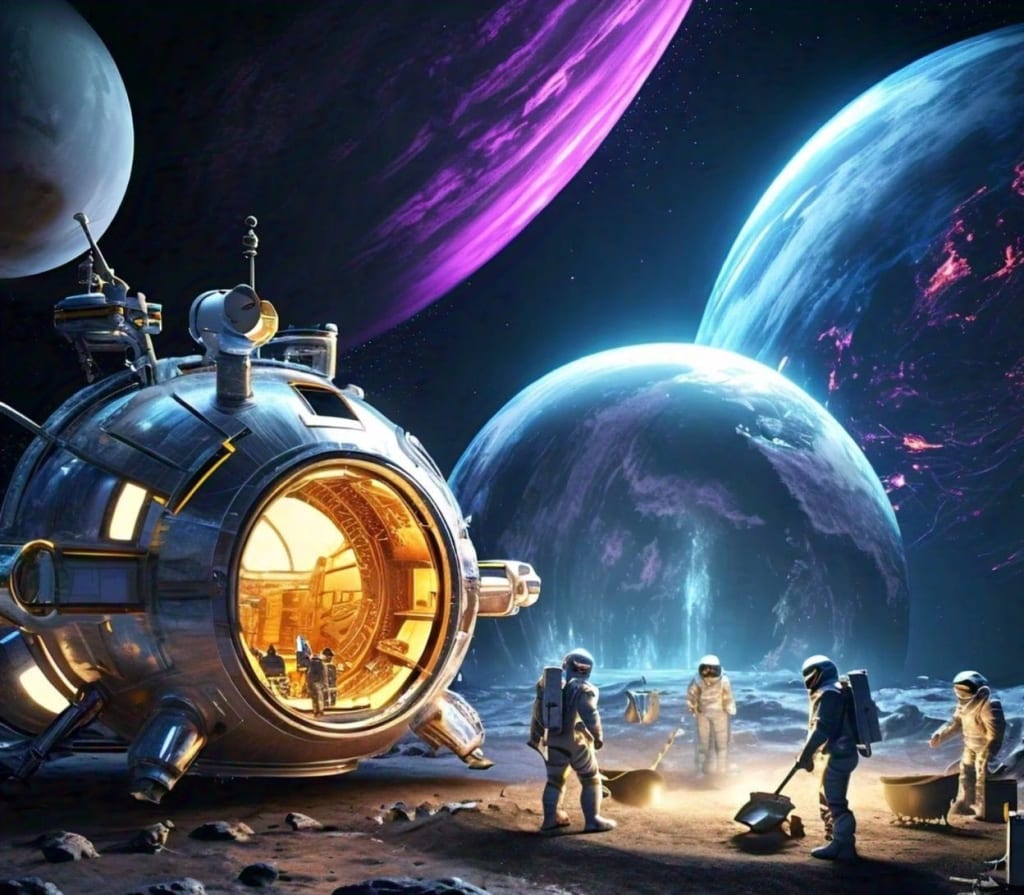The Impact of AI on Space Exploration
AI & SPACE EXPLORATION

Introduction
AI has revolutionized various industries and fields, but its impact on space exploration is particularly
noteworthy. As AI continues to evolve, it's transforming the way we explore space, enabling new discoveries, and improving mission success rates.
Robotics and Autonomy
AI-powered robots can operate independently in space, performing tasks that require precision and dexterity. NASA's Robonaut 2, for example, is a humanoid robot designed for space exploration, which uses AI to navigate and interact with its environment. With AI-driven autonomy, robots can handle complex tasks without human intervention, reducing the need for costly missions and increasing mission efficiency.
Data Analysis and Visualization
AI algorithms can quickly analyze vast amounts of data collected from space missions, such as satellite images or sensor readings. This enables scientists to identify patterns, trends, and anomalies more efficiently, leading to new discoveries and insights. AI-powered data visualization tools also help scientists better understand complex data sets, making it easier to spot meaningful patterns.
Predictive Maintenance
AI algorithms can predict equipment failures, reducing the risk of costly repairs or mission loss. By analyzing sensor data and maintenance records, AI-powered predictive maintenance systems can detect potential issues before they occur, allowing for proactive maintenance and minimizing downtime.
Optimization of Spacecraft Operations
AI algorithms can optimize spacecraft operations by analyzing data from various sensors and optimizing propulsion systems, energy consumption, and communication protocols. This results in more efficient resource allocation, reduced fuel consumption, and increased mission success rates.
Improved Mission Planning
AI-powered mission planning tools can help scientists and engineers create more efficient and effective missions by identifying the best course of action for space exploration, taking into account factors like weather patterns, radiation levels, and celestial body positions. AI-driven mission planning enables more accurate predictions, reduced risk of failure, and increased chances of success.
Enhanced Communication
AI-powered communication systems can improve the transmission and reception of data between spacecraft, ground stations, and other satellites, ensuring reliable and efficient communication in space. AI-driven communication protocols also enable faster data transfer rates, reducing latency and improving overall system performance.
Space Weather Forecasting
AI algorithms can analyze data from solar observatories and predict space weather events like solar flares and coronal mass ejections, enabling more accurate forecasting and better protection for Earth's magnetic field. This
helps reduce the impact of space weather on our daily lives, minimizing disruptions to global communication networks and satellite operations.
Exoplanet Discovery
AI-powered exoplanet discovery methods have significantly improved the detection of distant planets, helping scientists identify potentially habitable worlds that might harbor life beyond Earth. AI-driven exoplanet hunting enables faster detection of new planets, increasing our understanding of the universe and the potential for discovering extraterrestrial life.
Asteroid Tracking and Deflection
AI algorithms can help track and predict asteroid orbits, enabling more effective deflection strategies to protect Earth from potential impacts. By analyzing asteroid trajectories and identifying potential threats, AI-powered asteroid tracking systems can reduce the risk of catastrophic events and minimize the need for costly mitigation efforts.
Virtual Reality for Space Exploration
AI-powered virtual reality (VR) and augmented reality (AR) technologies are being developed to immerse people in space exploration experiences, making education and outreach more engaging and accessible. VR and AR also enable scientists to simulate complex space scenarios, reducing costs and increasing the effectiveness of training programs.
Conclusion
In conclusion, AI is revolutionizing space exploration by improving robotics, data analysis, predictive
maintenance, mission planning, communication, space weather forecasting, exoplanet discovery, asteroid tracking, and virtual reality experiences. As AI continues to advance, we can expect even more innovative applications in this field, enabling humanity to push further into the cosmos and expand our understanding of the universe.
FAQ
1. How is AI impacting space exploration?
AI is transforming space exploration by improving mission efficiency, accuracy, and effectiveness, as well as enabling new discoveries and insights.
2. What are some examples of AI-powered robotics in space exploration?
NASA's Robonaut 2 is a humanoid robot designed for space exploration that uses AI to navigate and interact with its environment.
3. How does AI enhance data analysis and visualization in space exploration?
AI algorithms can quickly analyze vast amounts of data collected from space missions, enabling scientists to identify patterns, trends, and anomalies more efficiently.
4. What are some potential applications of AI-powered virtual reality for space exploration?
AI-powered VR and AR technologies enable immersive experiences, making education and outreach more engaging and accessible, while also simulating complex space scenarios.
About the Creator
HAFIZ WASAF
A seasoned tech writer with a passion for exploring the latest trends and developments in tech industry.






Comments
There are no comments for this story
Be the first to respond and start the conversation.